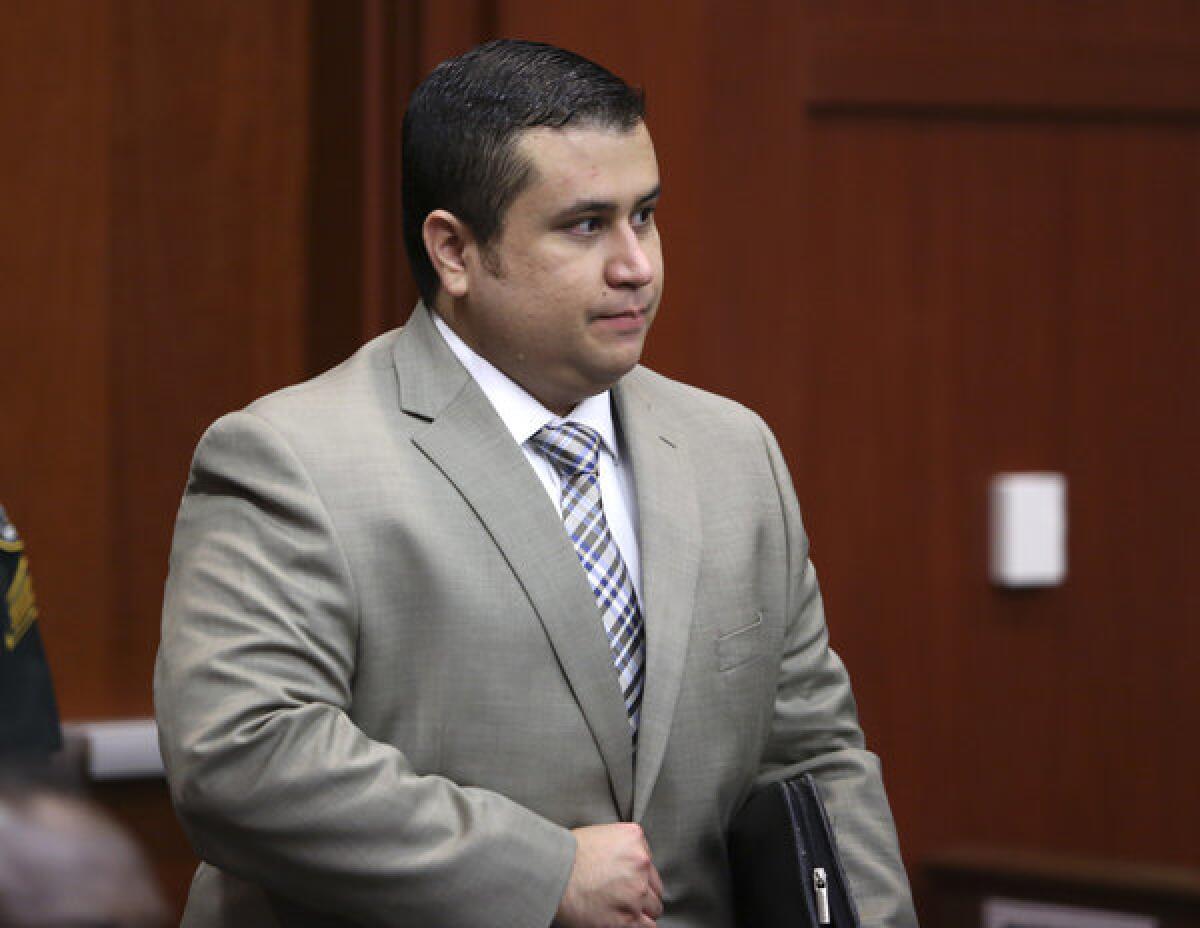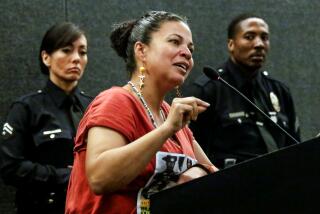Rules for neighborhood watch discussed in George Zimmerman trial

The police department official who worked with George Zimmerman on establishing a neighborhood watch program at a gated community in Sanford, Fla., testified Tuesday that members of such groups were not supposed to follow suspicious people and were told to stand aside and allow the police to do their jobs.
On the second day of witness testimony in the well-publicized murder case, Wendy Dorival of the Sanford, Fla., police department described the protocols under which neighborhood watch groups operated.
She took the stand after Judge Debra S. Nelson had earlier reserved deciding whether to admit five tapes of Zimmermanâs calls to emergency dispatchers before the night he had his deadly confrontation with Trayvon Martin, an unarmed African American teenager.
PHOTOS: The controversial case in pictures
Zimmerman, 29, is charged with second-degree murder in the shooting death of Martin, 17, on Feb. 26, 2012 in the gated community, the Retreat at Twin Lakes, in Sanford. Zimmerman has apologized for shooting Martin but insisted that he acted in self-defense after Martin attacked him during their confrontation.
There is no dispute that Zimmerman was in the housing community when he saw Martin that rainy night returning from a convenience store where he had bought candy and a soft drink. Zimmerman called police to report seeing what he said was a suspicious person. The dispatcher who took that call testified on Monday that he advised, but not ordered, Zimmerman to let police handle the situation.
Dorivalâs testimony goes to the prosecutionâs contention that Zimmerman should have let police deal with the situation. In his opening statement, prosecutor John Guy argued that Zimmerman profiled, confronted and shot Martin not because he had to, but because Zimmerman wanted to.
GRAPHIC: Whoâs who in the Trayvon Martin case
Dorival, a civilian with the Sanford police department, was volunteering as a coordinator because she believed in neighborhood watch programs. She would do presentations to those wanting to start such programs. She said she is still at the police department but in a different position.
Dorival testified that in fall 2011, she visited Zimmerman and other residents at the housing complex to discuss setting up a watch program. During her testimony, prosecutor Guy focused on her instructions to residents about how to behave when they spotted a suspicious person.
âTheir duty is to be the eyes and ears. Report crime as they see it,â said Dorival, adding that she provided handouts stressing this and also explained it verbally during the meeting. Zimmerman was there as the neighborhood watch coordinator, a role he told Dorival had been assigned him by the president of the homeownersâ association.
Guy asked Dorival what the handouts and her instructions tell volunteers to do if they begin following a suspicious person.
âWe tell them they donât do that. Thatâs the job of law enforcement,â she replied.
The same instructions apply to confronting a suspicious person, Dorival said. She said her presentation would advise people, âNot to confront, to let ⌠the police department do the job.
âTheyâre not supposed to take matters into their own hands. ⌠Let law enforcement take the risk of approaching a suspect,â Dorival said.
Under cross-examination by defense attorney Don West, Dorival said Zimmerman raised no red flags. âHe was very professional with me. He seemed a little meek to me. He seemed like he really wanted to make changes in his community to make it better,â she said.
West then asked Dorival if police would ever tell a neighborhood watch volunteer that they had no right to defend themselves if they were attacked, the central argument by the defense.
âOh, not at all,â Dorival replied.
Tuesday began with the lawyers arguing about the admissibility of calls made by Zimmerman to police dispatchers before the February confrontation with Martin. The prosecution would like to admit the calls, arguing they show Zimmermanâs state of mind.
Prosecutor Richard Mantei told Nelson that the five calls are central to the prosecutionâs argument that Zimmerman committed second-degree murder because they show his growing ill will at people he viewed as suspicious who were walking through his neighborhood. In each of the calls, which were played with the jurors outside the courtroom, Zimmerman described the suspicious characters as black males.
The calls illustrate Zimmermanâs frustration with repeated break-ins at the gated community and is part of the prosecutionâs theory that his view of Martin as a suspicious character was âthe straw that broke the camelâs back,â Mantei said.
Defense attorney Mark OâMara argued that the calls were irrelevant and that no previous incidents matter except the seven or eight minutes before Zimmerman fired the deadly shot into Martinâs chest.
âTheyâre going to ask the jury to make a leap from a good, responsible, citizen behavior to seething behavior,â OâMara said of the prosecutionâs depiction of Zimmermanâs actions.
ALSO:
Rusty the red panda escapes from National Zoo for a field trip
Texas students have strong opinions on affirmative action ruling
Nik Wallenda survives tightrope walk over gorge near Grand Canyon
Twitter: @tinasusman
More to Read
Sign up for Essential California
The most important California stories and recommendations in your inbox every morning.
You may occasionally receive promotional content from the Los Angeles Times.












